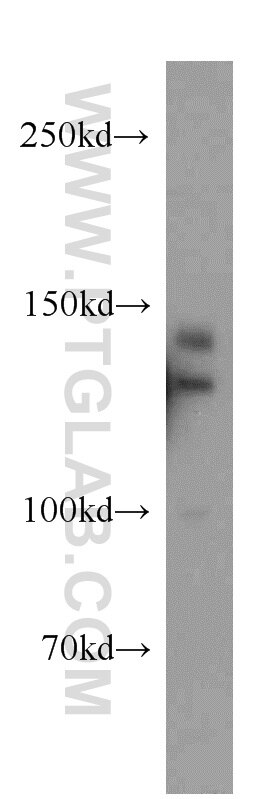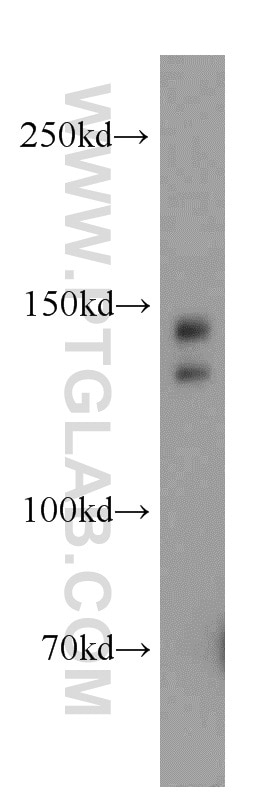TRERF1 Polyklonaler Antikörper
TRERF1 Polyklonal Antikörper für WB, ELISA
Wirt / Isotyp
Kaninchen / IgG
Getestete Reaktivität
human, Maus
Anwendung
WB, IHC, ELISA
Konjugation
Unkonjugiert
Kat-Nr. : 20062-1-AP
Synonyme
Galerie der Validierungsdaten
Geprüfte Anwendungen
| Erfolgreiche Detektion in WB | MCF7 cells, MCF-7-Zellen |
Empfohlene Verdünnung
| Anwendung | Verdünnung |
|---|---|
| Western Blot (WB) | WB : 1:200-1:1000 |
| It is recommended that this reagent should be titrated in each testing system to obtain optimal results. | |
| Sample-dependent, check data in validation data gallery | |
Veröffentlichte Anwendungen
| IHC | See 1 publications below |
Produktinformation
20062-1-AP bindet in WB, IHC, ELISA TRERF1 und zeigt Reaktivität mit human, Maus
| Getestete Reaktivität | human, Maus |
| In Publikationen genannte Reaktivität | human |
| Wirt / Isotyp | Kaninchen / IgG |
| Klonalität | Polyklonal |
| Typ | Antikörper |
| Immunogen | Peptid |
| Vollständiger Name | transcriptional regulating factor 1 |
| Berechnetes Molekulargewicht | 132 kDa |
| Beobachtetes Molekulargewicht | 132-140 kDa |
| GenBank-Zugangsnummer | NM_033502 |
| Gene symbol | TRERF1 |
| Gene ID (NCBI) | 55809 |
| Konjugation | Unkonjugiert |
| Form | Liquid |
| Reinigungsmethode | Antigen-Affinitätsreinigung |
| Lagerungspuffer | PBS mit 0.02% Natriumazid und 50% Glycerin pH 7.3. |
| Lagerungsbedingungen | Bei -20°C lagern. Nach dem Versand ein Jahr lang stabil Aliquotieren ist bei -20oC Lagerung nicht notwendig. 20ul Größen enthalten 0,1% BSA. |
Hintergrundinformationen
TRERF1, also named as BCAR2, RAPA and TREP132, activates transcription of CYP11A1. TRERF1 interaction with CREBBP and EP300 results in a synergistic transcriptional activation of CYP11A1. The antibody recognizes the C-term of TRERF1.
Protokolle
| Produktspezifische Protokolle | |
|---|---|
| WB protocol for TRERF1 antibody 20062-1-AP | Protokoll herunterladen |
| Standard-Protokolle | |
|---|---|
| Klicken Sie hier, um unsere Standardprotokolle anzuzeigen |
Publikationen
| Species | Application | Title |
|---|---|---|
Cancer Manag Res MIR31HG Expression Predicts Poor Prognosis and Promotes Colorectal Cancer Progression. |



